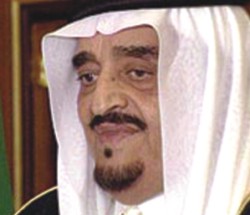|
Obituary
Curtain Falls on a Turbulent
Political Career
King Fahd, who ascended the Saudi throne in 1982, was one of seven sons of the founder of Saudi Arabia, King Abdel-Aziz, and his favourite wife, Hassa.
He was the fourth of his siblings to be king. Two of his brothers lost power violently - one was deposed in a coup; the other was assassinated. He had a reputation as a playboy in his youth, with allegations of womanising, drinking and gambling to excess. Indeed, it is claimed that he once lost more than $6m in one night at the Monte Carlo casino.
But he settled down in the 1950s to take ministerial positions in the Saudi administration. When he became king, he already had a great deal of political experience. He had been a reforming minister of education, playing a role in furthering the education of women in Saudi Arabia.
The young Fahd was known as a technocrat and political wheeler-dealer. He knew about internal security and about how the kingdom needed to be defended from within.
He also had a reputation as something of a diplomat, who understood the intricacies of foreign policy, especially the importance of the Saudi dynasty's relationship with the United States.
 Such political finesse was valuable when Fahd had to steer the kingdom through the leaner and more troubled period following the oil boom of the 1970s. Saudi Arabia is home to the world's greatest oil reserves and, during the 1970s, the petro-dollars flooded in. There was a joke that new Cadillacs were dumped as soon as their ashtrays were full. King Fahd himself amassed a personal fortune estimated at $18bn. Such political finesse was valuable when Fahd had to steer the kingdom through the leaner and more troubled period following the oil boom of the 1970s. Saudi Arabia is home to the world's greatest oil reserves and, during the 1970s, the petro-dollars flooded in. There was a joke that new Cadillacs were dumped as soon as their ashtrays were full. King Fahd himself amassed a personal fortune estimated at $18bn.
Such a boom could not be sustained. By the early 1980s, just when King Fahd came to power, annual oil income began to fall.
Saudi Arabia, with its huge oil production and massive reserves, had always been a paternalistic state which prided itself on giving its citizens cradle-to-grave care.
Fahd was forced to introduce some austerity measures to stem state spending. Other threats to his authority came from outside. The 1979 Revolution in Iran led to fears that Islamic upheaval could spread to Saudi Arabia. King Fahd spent vast amounts supporting Iraq in its war with Iran.
He also tried to strengthen his own Islamic legitimacy. In 1986, he took the title Khadim al-Haramayn al-Sharifayn (Custodian of the Two Holy Mosques) to indicate his protection of the sacred Muslim sites in the cities of Makkah and Medina.
But the greatest threat was still to come. In 1990, Iraq invaded neighbouring Kuwait. King Fahd made the sensitive decision to invite Western forces onto Saudi soil to protect the kingdom.
He told his people, "These forces are participating in joint exercises with Saudi Arabia. Their presence will be temporary."
After the war, though, US forces did not leave. A bomb explosion at their desert headquarters in 1996 killed 19 and appeared to signal the depth of popular resentment. But many Saudis, and Muslims further afield, believed that the stationing of non-Muslim soldiers in the birthplace of Islam went directly against an explicit ruling of the Prophet Muhammad.
That impression intensified after the attacks on the United States on 11 September 2001. Fifteen of the hijackers were thought to have been Saudi nationals.
And the Saudi-born Osama Bin Laden had often pledged to drive the "infidels" out of Saudi Arabia. At times, popular movements opposed to the royal family within the country have raised their colours, a dangerous activity in what remains a highly-repressive country.
The huge cost of the Gulf War meant that the king had to take some even more stringent economic austerity measures. King Fahd found himself faced with a whole series of interlocking crises - economic, political and military - which the ailing leader seemed ill-equipped to keep under control.
King Fahd's health had long been a problem. He was diabetic, for many years a heavy smoker and suffered a stroke in 1995. Officially, after a relatively short break at the time, he resumed his many of his duties using a wheelchair and stick.
His chosen successor, his half-brother Abdullah, is the head of the National Guard, the tribal army largely responsible for the kingdom's internal security.
An austere and respected figure, Crown Prince Abdullah is untainted by corruption, while being regarded by many as less enthusiastically pro-American than King Fahd. And among watchers of the opaque world of Saudi statecraft, Crown Prince Abdullah is thought already to have been de facto ruler for much of the past five years.
This article was first published on bbcnews.com
Copyright
(R) thedailystar.net 2005 |
